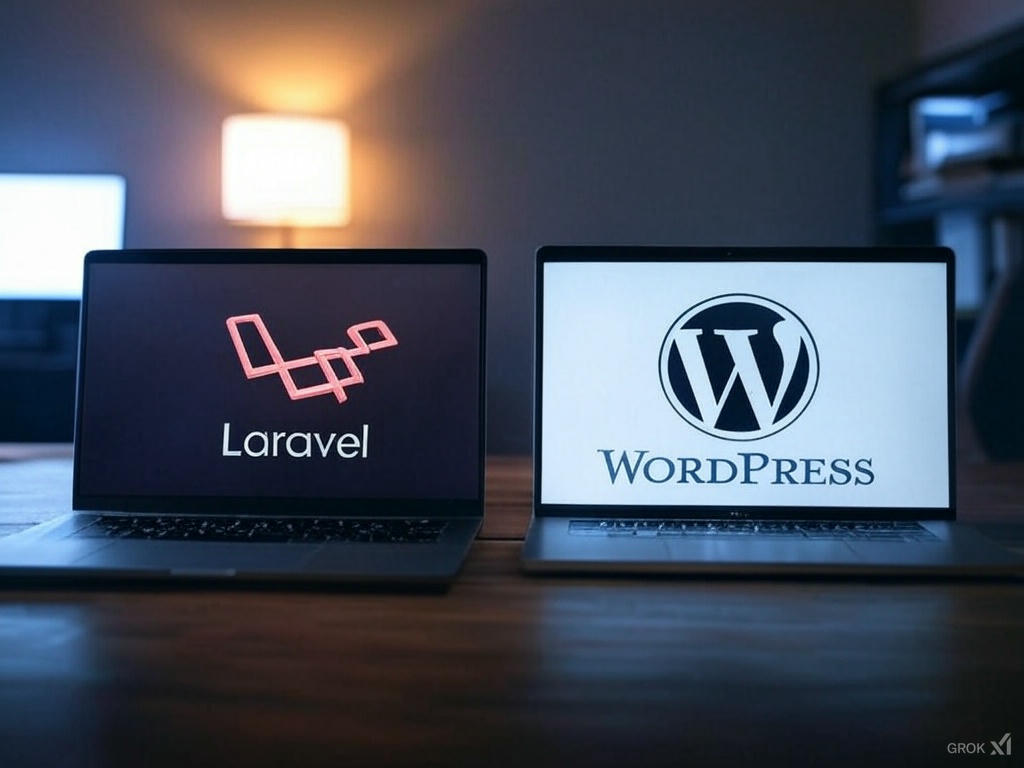Laravel vs. WordPress: Which One Should You Use?
February 21, 2025

Introduction
When it comes to building a website or web application, the platform you choose can make or break your project. Two of the most popular options in the web development world are Laravel and WordPress. But how do you decide which one is right for your needs?
Laravel is a powerful PHP framework designed for developers who want to build custom web applications from scratch. On the other hand, WordPress is a user-friendly content management system (CMS) that powers over 40% of websites on the internet.
Whether you’re a developer, business owner, blogger, or startup founder, this guide will help you understand the strengths and weaknesses of each platform so you can make an informed decision.
1️⃣ Overview of Laravel & WordPress
What is Laravel?
Laravel is a PHP framework designed for developers who need to build robust, scalable, and custom web applications. It’s packed with features like:
MVC architecture for clean and organized code.
Built-in tools for routing, authentication, and API development.
Database migrations for seamless database management.
A vibrant ecosystem with packages like Laravel Forge, Horizon, and Nova.
In short, Laravel is a developer’s playground for creating tailored solutions.
What is WordPress?
WordPress is the world’s most popular CMS, known for its simplicity and versatility. It’s ideal for creating blogs, business websites, and even e-commerce stores using plugins like WooCommerce. Key features include:
Themes and plugins for easy customization.
A beginner-friendly dashboard that requires no coding knowledge.
Built-in SEO tools to help your website rank higher on search engines.
A massive community and extensive documentation.
WordPress is perfect for those who want to get a website up and running quickly.
2️⃣ Key Differences Between Laravel & WordPress
| Feature | Laravel | WordPress |
|---|---|---|
| Type | PHP Framework | Content Management System (CMS) |
| Ease of Use | Requires coding expertise | Beginner-friendly, no coding needed |
| Customization | Full flexibility for custom-built solutions | Limited to themes and plugins |
| Performance | Faster (when optimized) | Can slow down with too many plugins |
| Security | Stronger (manual implementation) | Secure but vulnerable to outdated plugins |
| SEO | Requires manual implementation | Built-in SEO-friendly features |
| Scalability | Best for large, complex applications | Suitable for blogs and small businesses |
3️⃣ When to Use Laravel?
✅ Best For:
Custom web applications like CRMs, SaaS platforms, or dashboards.
Scalable enterprise projects that require advanced functionality.
Developers who want full control over their code and architecture.
Projects that need advanced database management and API integrations.
❌ Not Ideal For:
Non-developers or those who want a quick, no-code solution.
Simple websites or blogs that don’t require complex functionality.
4️⃣ When to Use WordPress?
✅ Best For:
Blogs, portfolios, and business websites.
E-commerce stores (thanks to WooCommerce).
SEO-focused websites that need built-in optimization tools.
Non-developers who want to launch a website quickly without coding.
❌ Not Ideal For:
Highly customized applications that require advanced logic or scalability.
Projects where performance and security are top priorities (without extensive optimization).
5️⃣ Laravel vs. WordPress for E-commerce
WooCommerce (WordPress):
WooCommerce is a popular choice for e-commerce websites due to its ease of use and extensive plugin ecosystem. However, it can become sluggish if you overload it with too many plugins or have a high-traffic store.
Laravel E-commerce:
For more complex e-commerce needs, Laravel offers custom-built solutions or packages like Bagisto. While it requires coding expertise, it provides better scalability, performance, and flexibility for large-scale online stores.
6️⃣ Conclusion: Which One Should You Choose?
The choice between Laravel and WordPress ultimately depends on your project requirements and technical expertise:
Choose Laravel if you need a custom, scalable, and high-performance web application. It’s perfect for developers who want full control over their code and architecture.
Choose WordPress if you need a quick, user-friendly solution for blogs, business websites, or small e-commerce stores. It’s ideal for non-developers or those with limited technical skills.
Final Tip:
If you’re still unsure, consult a professional developer to evaluate your project’s specific needs. The right platform can save you time, money, and headaches in the long run!
